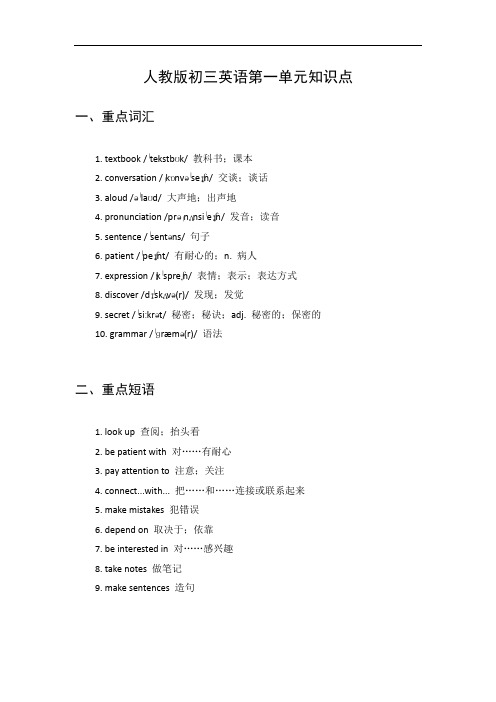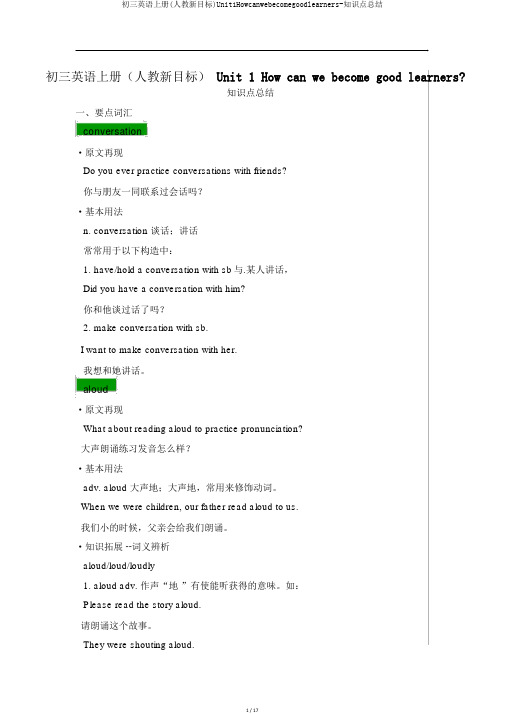初三英语上册unit1知识点复习
九年级英语上册第一单元知识点

九年级英语上册第一单元知识点Unit 1 How can we become good learners? 短语总结:1.have conversation with sb.同某人谈话2.too…to…太……而不能3.the secret to………的秘诀4.be afraid of doing sth./be afraid to dosth.害怕做某事5.look up查阅6.make mistakes in在……方面犯错误7.connect……with…把…和…连接/联系起来8.get bored感到厌烦9.be stressed out焦虑不安的10.pay attention to注意;关注11.depend on取决于;依靠12.the ability to do sth..做某事的能力二.用法集萃1.by doing sth通过做某事2.it+be+adj+to do sth做某事是……的3.finish doing sth完成某事4.what about doing sth?做某事怎么样?5.try to do sth尽力做某事6.the+比较近,the+比较近越……,就越……7.find it+adj+to do sth发现做某事8.be afraid of doing sth害怕做某事9.help sb(to)do sth帮助某人做某事10.practice doing sth练习做某事11.keep doing sth一直做某事12.be afraid to do sth害怕做某事13.begin to do sth开始做某事14.want to do sth想要做某事15.need to do sth需要做某事16.remember to do sth记得做某事17.shoot射(射着,射死等表结果)18.shoot at(瞄准)射。
人教版初三英语第一单元知识点

人教版初三英语第一单元知识点一、重点词汇1. textbook /ˈtekstbʊk/ 教科书;课本2. conversation /ˌkɒnvəˈseɪʃn/ 交谈;谈话3. aloud /əˈlaʊd/ 大声地;出声地4. pronunciation /prəˌnʌnsiˈeɪʃn/ 发音;读音5. sentence /ˈsentəns/ 句子6. patient /ˈpeɪʃnt/ 有耐心的;n. 病人7. expression /ɪkˈspreʃn/ 表情;表示;表达方式8. discover /dɪˈskʌvə(r)/ 发现;发觉9. secret /ˈsiːkrət/ 秘密;秘诀;adj. 秘密的;保密的10. grammar /ˈɡræmə(r)/ 语法二、重点短语1. look up 查阅;抬头看2. be patient with 对……有耐心3. pay attention to 注意;关注4. connect...with... 把……和……连接或联系起来5. make mistakes 犯错误6. depend on 取决于;依靠7. be interested in 对……感兴趣8. take notes 做笔记9. make sentences 造句三、重点句型1. —How do you study for a test? 你是怎样为考试而学习的?—I study by working with a group. 我通过和小组一起学习。
2. It's too hard to understand spoken English. 听懂英语口语太难了。
3. The more you read, the faster you'll be. 你读得越多,你就会读得越快。
4. Why did Wei Fen find it difficult to learn English? 为什么魏芬觉得学英语很难?5. I was afraid to ask questions because of my poor pronunciation. 因为我的发音不好,我害怕问问题。
初三英语上册(人教新目标)Unit1Howcanwebecomegoodlearners-知识点总结

初三英语上册(人教新目标)Unit 1 How can we become good learners?知识点总结一、要点词汇conversation·原文再现Do you ever practice conversations with friends?你与朋友一同联系过会话吗?·基本用法n. conversation 谈话;讲话常常用于以下构造中:1. have/hold a conversation with sb与.某人讲话,Did you have a conversation with him?你和他谈过话了吗?2. make conversation with sb.I want to make conversation with her.我想和她讲话。
aloud·原文再现What about reading aloud to practice pronunciation?大声朗诵练习发音怎么样?·基本用法adv. aloud 大声地;大声地,常用来修饰动词。
When we were children, our father read aloud to us.我们小的时候,父亲会给我们朗诵。
·知识拓展 --词义辨析aloud/loud/loudly1.aloud adv. 作声“地”有使能听获得的意味。
如:Please read the story aloud.请朗诵这个故事。
They were shouting aloud.他们在大声地呼叫。
2.loud. adv. 大声“地,大声地,响亮地”,常指在谈笑等方面。
如:Don't talk so loud.不要这样大声地讲话。
Speak louder.说得大声点儿。
3.loudly adv. 大声“地”有时与 loud 通用,但含有喧杂的意味。
如:Someone knocked loudly at the door.有人大声叩门。
(完整版)九年级英语上册第一单元知识点总结

九年级英语上册第一单元知识点总结九年级英语上册第一单元知识点总结Unit 1一、知识点: 在旅馆的登记入住。
ut: 在旅馆结账离开。
2.By: ①通过…..方式(途径)。
例:I learn English by listening to tapes.②在…..旁边。
例:by the window/the door③乘坐交通工具例:by bus/car④在……之前,到……为止。
例:by October在10月前⑤被例:Englby many people.3.how与what的区别:how通常对方式或程度提问,意思有:怎么样如何,通常用来做状语、表语。
what通常对动作的发出者或接受者提问,意思为什么,通常做宾语,主语。
①How is your summer holiday? It’s OK.(how表示程度做表语)②How did you travel around the world? I travel by air.③What do you learn at school? I learn English, math and maubjects.① What……? How…like…?② What…do with…? How…deal with…?③ What…like about…? How…like…?④ What’s the weather like today? How’s the weather today?⑤ What to do? How to do it?e.g. What do youbook?=How do you lbook?I don’t know what I should do watter.=I don’t know how I should deal wWhat do you like about China?=How do you la?I don’t know what to do next step?=I don’t know how to do it next step?㊣ What good / bad weaday!(weather为不可数名词,其前不能加 a )㊣ What a fine / bad daday! (day为可数名词,其前要加 a )4. aloud, loud与loudly的用法 : 三个词都与"大声"或"响亮"有关。
九年级上册英语第一单元知识点

九年级上册英语第一单元知识点九年级上册的英语教材第一单元主要介绍了一些基础的语法知识和词汇,本文将对这些知识点进行详细的讲解和总结。
一、动词的时态1.一般现在时:表示经常性或习惯性的动作,结构为主语+动词原形。
例如:I often play basketball.2.一般过去时:表示过去某个时间发生的动作,结构为主语+动词的过去式。
例如:He watched a movie last night.3.一般将来时:表示将来要发生的动作,结构为主语+will+动词原形。
例如:We will go shopping tomorrow.二、名词的复数形式1.一般情况下,名词复数形式在词尾加-s。
例如:book-books,cat-cats.2.以-s、-sh、-ch、-x结尾的名词,在词尾加-es。
例如:bus-buses,brush-brushes.3.以辅音字母+y结尾的名词,变y为i,再加-es。
例如:party-parties,city-cities.4.以-o结尾的名词,有时在词尾加-es,有时只加-s。
例如:photo-photos,piano-pianos.三、形容词的比较级和最高级1.比较级的构成:原级+er。
例如:big-bigger,slow-slower.2.最高级的构成:原级+est。
例如:big-biggest,slow-slowest.3.部分形容词的比较级和最高级形式不规则,需要特殊记忆。
例如:good-better-best,bad-worse-worst.四、副词的用法副词用来修饰动词、形容词和其他副词,常放在句子的中间或末尾。
例如:She sings beautifully.一些常见的副词有:well,quickly,carefully,sometimes等。
五、连词的使用1.并列连词:用来连接并列的词或短语,常见的有and,but,or等。
例如:I like apples and oranges.2.转折连词:用来引导转折关系的句子,常见的有however,although,but等。
九年级上英语unit1知识点

九年级上英语unit1知识点Unit 1 Topics in Grade 9 EnglishIntroduction:In the first unit of Grade 9 English, students are introduced to various important topics that lay the foundation for their language learning journey. These topics range from grammar and vocabulary to reading and writing skills. Let's delve into some key knowledge points covered in this unit.1. Basic Grammar Concepts:1.1 Parts of Speech:Understanding the different parts of speech is essential for effective communication. In this unit, students learn about nouns, pronouns, verbs, adjectives, adverbs, conjunctions, and prepositions. They explore how these parts of speech function in sentences by identifying their role and usage.1.2 Verb Tenses:Verb tenses play a vital role in expressing actions and states of being. Students are introduced to the simple present, present continuous,simple past, past continuous, and future tenses. They practice constructing sentences and using appropriate verb forms for each tense.2. Vocabulary Expansion:2.1 Word Formation:Building vocabulary is crucial for language proficiency. In this unit, students learn about word formation processes like compounding, blending, abbreviations, and acronyms. They discover how these processes contribute to the creation of new words and expressions.2.2 Opposites and Synonyms:Being able to identify and use opposites and synonyms enhances students' language skills. They learn common word pairs and expressions that display opposite meanings or similar concepts. Engaging activities and exercises help reinforce the understanding of these vocabulary relationships.3. Reading Skills:3.1 Skimming and Scanning:Efficiently extracting information from texts is a valuable skill. Students learn to skim through passages to get the gist of the content and scan for specific details. These techniques assist in better understanding and quick retrieval of information.3.2 Identifying Main Ideas and Supporting Details:Understanding the main ideas and supporting details helps students comprehend texts effectively. They practice identifying the topic sentence, main points, and relevant details in passages. This skill allows them to grasp the overall message of a text and distinguish between essential and non-essential information.4. Writing Skills:4.1 Narrative Writing:Through narrative writing, students develop their ability to create engaging stories. They explore elements like characters, setting, plot, conflict, and resolution. Writing prompts and activities encourage students to structure their narratives coherently and express their creativity.4.2 Descriptive Writing:Descriptive writing enables students to vividly portray people, places, or objects in their writing. They learn to incorporate sensory details, figurative language, and precise vocabulary to create a vivid picture in the reader's mind.Conclusion:The first unit of Grade 9 English encompasses essential knowledge points that provide a solid foundation for further language learning. From understanding grammar concepts and expanding vocabulary to developing reading and writing skills, students acquire the necessary tools to enhance their English proficiency. With continued practice and application of these knowledge points, students will confidently navigate through their English language journey.。
九年级上册英语unit1知识点归纳
九年级上册英语unit1知识点归纳九年级上册英语Unit 1 知识点归纳英语学习是九年级上册的重要内容之一。
Unit 1是我们所学知识点的首个单元,本文将对该单元的重要知识进行归纳和总结。
通过本文的阅读,希望能够帮助大家更好地掌握相关知识,提高英语学习的效果。
一、被动语态被动语态是英语中重要的语法结构之一。
在Unit 1中,我们学习了被动语态的用法和构成。
被动语态由助动词“be”加上动词的过去分词构成。
例如:Active: The boy broke the window.Passive: The window was broken by the boy.需要注意的是,在被动语态中,谓语动词的时态要根据句子的主语来确定。
“be”的形式可以根据句子的时态和人称的不同进行变化。
同时,被动语态常常用于强调动作的承受者,或者当我们不知道或不关心动作的执行者时。
二、情态动词情态动词在英语中有着特殊的用法和含义。
Unit 1中,我们学习了情态动词的用法和常见的几个情态动词,如can, could, may, might等等。
情态动词具有以下几个特点:1. 不具备人称和数的变化。
即情态动词在句子中不需要根据主语的不同来进行变化。
2. 情态动词后面接动词原形,不加任何词尾。
3. 情态动词本身已经具备了很强的意义,所以在句子中往往只需要一个情态动词,不需要再加其他的助动词。
情态动词的具体用法和含义需要根据上下文来进行理解和把握。
例如:Can I go to the party?(表示请求)He could speak three foreign languages when he was ten.(表示能力)May I help you?(表示许可)You might pass the exam if you work hard.(表示可能性)三、虚拟语气虚拟语气是英语语法中的一种特殊形式。
在Unit 1中,我们学习了虚拟语气的用法和构成。
九年级英语上Unit1知识点归纳
九年级英语上Unit1知识点归纳Unit 1 How can we e good learners?课文知识点解析by+doing形式”表示方式、方法by+doing形式”表示通过做某事的方式或方法。
例如:I learn XXX 通常用来回答How do you。
或How can I。
这类句型。
例如:How can I turn on the light。
By turning this button.拓展:介词by的其他用法:1.XXX交通工具,“乘/坐。
”例如:by bus2.by+地点,“在。
的旁边;靠近。
”例如:by XXX3.by+时间,“截止到。
不迟于。
”例如:XXX4.辨析by、with、in,“用”by:侧重“用”某种手段、交通工具、传递方式或媒介等with:侧重“用”有形工具、材料、内容等in:侧重“用”语言、语调、笔墨、颜色等例如:XXX.n A1.通过向老师求助,来提高研究效果。
(P1)使用“by+动名词/名词/代词”表示通过某种方式或方法。
例如:by hand。
ask(sb)for sth表示“向某人要某物;要求某人某事”。
2.你是否用英语与朋友交谈?(P2)XXX表示“交谈;谈话”。
与动词have/hold连用时,须加不定冠词,但与动词make连用时,不加不定冠词。
常用短语有:have/hold XXX。
“与。
交谈/谈话”;make n“闲谈;搭讪”;XXX。
“与。
在谈话”。
XXX reading aloud。
Reading aloud is different from reading loudly。
as it means reading in a way that others can hear you。
It can be a helpful way to XXX。
Some people find it too hard to understand spoken English。
九年级英语第一单元知识点归纳总结
九年级英语第一单元知识点归纳总结一、重点词汇1、 textbook n 教科书;课本2、 conversation n 交谈;谈话3、 aloud adv 大声地;出声地4、 pronunciation n 发音;读音5、 sentence n 句子6、 patient adj 有耐心的 n 病人7、 expression n 表情;表示;表达方式8、 discover v 发现;发觉9、 secret n 秘密;秘诀 adj 秘密的;保密的10、 grammar n 语法11、 repeat v 重复;重做12、 note n 笔记;记录 v 注意;指出13、 pal n 朋友;伙伴14、 physics n 物理;物理学15、 chemistry n 化学二、重点短语1、 work with friends 和朋友一起学习2、 make word cards 制作单词卡片3、 read aloud 大声朗读4、 practice conversations with 与练习对话5、 improve speaking skills 提高口语技能6、 give a report 作报告7、 at first 起初;起先8、 word by word 逐词地9、 be patient 有耐心10、 the secret to 的秘诀11、 because of 因为12、 fall in love with 爱上13、 look up 查阅;抬头看14、 take notes 做笔记15、 keep a diary 写日记三、重点句型1、 How do you study for a test? 你是怎样为考试而学习的?2、 I study by working with a group 我通过小组合作来学习。
3、 It's too hard to understand spoken English 英语口语太难懂了。
九年级英语上学期Unit1知识点
九年级英语Unit11. by + doing通过……方式如:by studying with a groupby 还可以表示:“在…旁”、“靠近”、“在…期间”、“用、”“经过”、“乘车”等如:I live by the river.I have to go back by ten o’clock.The thief entered the room by the window.The student went to park by bus.2. talk about 谈论,议论,讨论如:The students often talk about movie after class. 学生们常常在课后讨论电影。
talk to sb. === talk with sb. 与某人说话3. 提建议的句子:①What/ how about +doing sth.?如:What/ How about going shopping?②Why don’t you + do sth.?如:Why don’t you go shopping?③Why not + do sth. ? 如:Why not go shopping?④Let’s + do sth. 如:Let’s go shopping⑤Shall we/ I + do sth.?如:Shall we/ I go shopping?4. a lot 许多常用于句末如:I eat a lot. 我吃了许多。
5. too…to 太…而不能常用的句型too+adj./adv. + to do sth.如:I’m too tired to say anything. 我太累了,什么都不想说。
6. aloud, loud与loudly的用法三个词都与"大声"或"响亮"有关。
①aloud是副词,重点在出声能让人听见,但声音不一定很大,常用在读书或说话上。
- 1、下载文档前请自行甄别文档内容的完整性,平台不提供额外的编辑、内容补充、找答案等附加服务。
- 2、"仅部分预览"的文档,不可在线预览部分如存在完整性等问题,可反馈申请退款(可完整预览的文档不适用该条件!)。
- 3、如文档侵犯您的权益,请联系客服反馈,我们会尽快为您处理(人工客服工作时间:9:00-18:30)。
Unit 1 How do you study for a test ?(一)学习目标(Language Goal)1. Talk about how to study . 学会讨论各种学习方法和策略。
2. Find out your suitable learning methods. 找出适合自己的学习方法。
(二)语言结构(Language Structures)1. Verb + by with gerund by+动名词短语表示“通过…途径,方法”2. How questions have引导的特殊疑问句(三)目标语言(Target Language)1. How do you study for tests ? 你是怎样准备考试的?Well , I study by working with my classmates.哦,我和同学们一起学习。
2. Have you ever studied with a group ?你曾经参加过学习小组吗?Yes , I have . I’ve lear ned a lot that way .是的,参加过。
通过这种方式我学了许多。
3. I don’t have a partner to practice English with .我没有同伴可以练习英语。
Maybe you should join an English club.或许,你应该参加一个英语俱乐部。
4. What about reading aloud to practice pronunciation ?大声朗读来练习发音怎么样?Why don’t you join an English language club ?你为什么不参加一个英语俱乐部呢?(四)Key words and phrases (重点词汇)1. flashcard n. 抽认卡2. frustrating a. 令人沮丧的3. memorize v. 记忆,背诵4. aloud adv. 出声地、高声地5. comma n. 逗号6. pronunciation n. 发音7. solution n. 解决办法8. not at all 根本(不)全然(不)9. end up 结束,告…终10. make mistakes 犯错11. later on 以后;随后12. be afraid to 害怕去做13. laugh at sb. 笑话;取笑(某人)14. take notes 做笔记,做记录15. enjoy doing sth . 喜欢做…乐意做…16. native speaker 说本族语的人17. make up 组成、构成(四)重点、难点:(Key points and difficulties)1. by 介词,表示“通过…方法或途径”的意思,译成“靠、通过”by后面可以加名词或动名词短语eg.(1)The house was destroyed by fire. 房屋被火烧毁了。
(2)travel by air (land , sea)航空(陆路、航海)旅行。
(3)go by train (boat , bus)乘火车(船,公共汽车)去(4)shake sb by the hand 和某人握手(5)I study English by watching English movies. 我通过看英文电影学英语。
另外,by做为介词的含义有很多,我们也已经学习过一些用法,总结如下(1)在…旁边、靠近eg. There is a power station by the river. 河边有一个电厂。
(2)沿着、经由eg. come by the highway 由公路来(3)由于eg. by mistake 由于差错(4)被、由eg. some articles written by Luxun. 一些由鲁迅写的文章(5)(表示面积)eg. a room 5m,by4m 一间长五米宽四米的房间(6)逐批eg. One by one 一个接一个(7)表示方法、途径如上2. “How”questionsHow 引导特殊疑问句,有两种含义(1)表示问候eg. How do you do ?How are you ?How’s everything going ?(2)表示“怎样”eg. How is your new house ?你的新房子怎么样?It’s great.它太棒了。
How do you learn English ?你是怎样学英文的?I learn English by reading lots of English magazines.我通过读大量英文杂志学习英文。
请同学们注意how和what引导的疑问句是不一样的,不能混淆。
how通常对程度或方式进行提问,意为“怎么样”,回答通常做状语或表语,what 常对动作的发出者或接受者进行提问,意为“什么”,回答通常主语或宾语。
试比较:(1)How is your summer holiday ? It is perfect. (表程度,表语)(2)How did you travel around the world ?I travelled by bike. (表方式,状语)(3)What do you learn at school ?I learn Chinese , English , Maths and other subjects.(学习的科目,做宾语)3. 在这一单元中出现的话题是“讨论如何学习”。
这个话题既有趣又实用,既能锻炼我们的口语表达能力,又能使我们学到一些实用的方法,对自身的学习大有帮助。
如何向别人请教学习方法呢?又如何回答呢?请诵读下面的目标句型:How do you study English ? (运用特殊疑问句)I study by listening to cassetts. (听录音带)I study by studying with a group. (和小组一起学习)by watching English programs on TV. (看英语电视节目)by enjoying English songs. (听英文歌)by taking part in English classes after school . (上课外英语班)by getting an English tutor. (请英语家教)by reading English magazines and newspaper . (读英文杂志、报纸)by surfing the internet. (网上冲浪)by making flashcards. (制作单词认读卡片)by reading the textbook. (读教科书)by asking the teacher for help. (请教老师)by making vocabulary lists. (列单词表)by taking notes carefully . (认真记笔记)by having the English class carefully . (认真上课)by finishing my homework seriously . (认真完成作业)Do you learn English by …? (用一般疑问句)Yes , I do . / No , I don’t.Have you ever studied with a group ? (用完成时态)Yes , I have . I’ve learned a lot that way.What about listening to cassettes ? [用what about +动名词提问]I do that sometimes. I think it helps.4. 学会评价各种学习方法的优劣(Comment on the ways of learning English)看到了上面各种各样的学习方法,有些眼花缭乱。
其实,并不是所有的方法都适合自己。
我们要学会判断、评价,然后才能选择最适合自己的如:I think studying English by working with a group is a good way because you can ask others when you have questions.I think surfing the internet is a bad way because you have to use a computer and always waste your time.…这个句型较长是个复合句,出现了由because 引导的原因状语从句。
进入初三后,我们在写作表达时,要避免再使用仅仅由because 引导的句子,而要写完整的句子。
如:不能写Because I slept late . 意思不完整,不清晰要写成I missed the early bus because I slept late .这样,有原因,有结果,才是完整的句子。
5. 找出自己在英语学习中的困难(Find out your own difficulties in learning English)要选择适合自己的学习方法,还必须清楚自己的困难所在,然后才能有的放矢。
learning English can be difficult . What things are difficult for you ?我们如何来表达自己学习与遇到的困难呢?如何给出建议呢?请诵读下面的目标句型:说出困难:I have a problem . I can’t remember the new words.I can’t pronounce some of the words.I can’t understand spoken English .I always make mistakes in grammer.I read very slowly.I don’t know how to speak English well.给出建议:You should read English aloud.Listening can help.Why don’t you join an English language club to practice speaking.Would you mind remembering new words by flashcards.Please try to talk with your friends in English as much as possible.(请注意不同句式的运用)6. 选择适合自己的学习方法(Choose your suitable learning ways)通过以上各个环节的学习,我们终于可以完成最后的目标--选择适合自己的方法。
